Text


6K notes
·
View notes
Text
RIP Inspector Javert, you would have made a great corporate prosecutor
6K notes
·
View notes
Text
Okay so when I got sucked into the phantom zone last week while watching youtube shorts a lot of the content it fed me was ADHD tips and a lot of it was either useless for me or redundant but there was one REALLY good tip about taking breaks that wasn't about taking breaks it was about RETURNING from breaks and the tip is: when you are about to go on a break, before you step away from your task (work, craft project, school stuff) decide what you'll do as the first thing when you sit back down at your task and set up your workspace to do that thing.
That means you've got an easy re-entry point to go back to doing the thing instead of sitting back down and having to make a decision or having to reorient from break mode to task mode. You have pre-reoriented and can just go back into working mode.
I've been doing this by circling what my next task on my tasklist is and bringing up the windows that I'll need for the task before I step away from my desk.
Brilliant hack, works great for me, hope it works great for you as well.
16K notes
·
View notes
Text
why do we even have legal genders anyway. maybe we should not have those
41K notes
·
View notes
Text
i am a Sucker for scenarios where someone encounters their younger/other self and has the opportunity to give them the compassion and understanding they haven't received.
but I am also, and possibly even more, a Sucker for scenarios where someone encounters their younger/other self and uses it as an opportunity to externalize absolutely horrifying levels of self-loathing
737 notes
·
View notes
Text
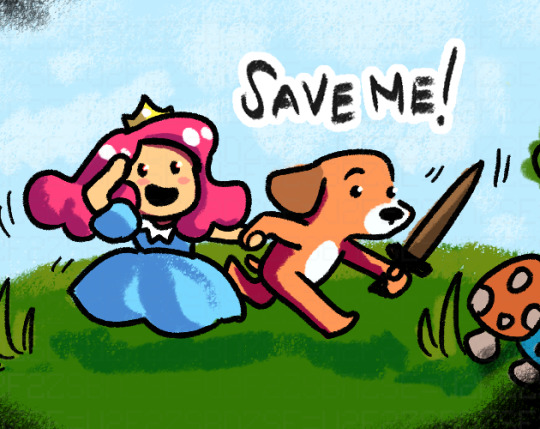

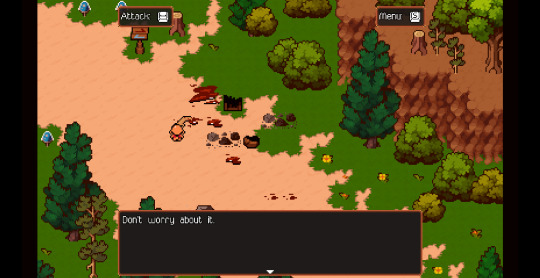

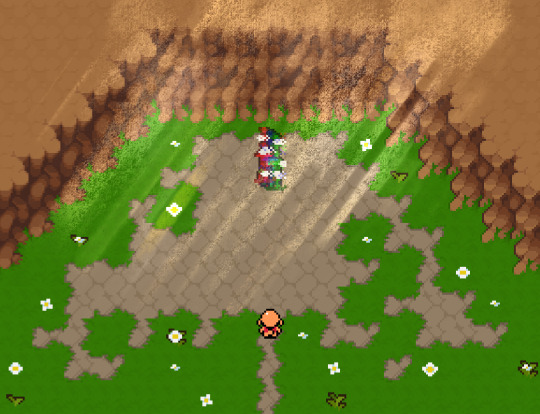

This is between ME and YOU!
hey remember when i stopped writing fic so I could make a video game?
bone apple teeth.
https://lazuliquetzal.itch.io/save-me
158 notes
·
View notes
Note
Ey so what was your thesis about Bionicle as a meta-narrative/story-about-stories? I´m a huge fan of meta-ficiton/meta-narratives and never thought of the series that way so your take regarding it got me really interested.
So, there’s a bunch of facets to this.
Basically, Bionicle characters know they are in a story. This doesn’t mean that they know they’re fictional characters or that there’s an audience of humans watching, but their universe designates people as heroes, villains, and bystanders/victims. The universe runs on story logic, almost to the same extent as Discworld, though with superhero comics and hero mythologies rather than high fantasy and fairy tales. The “genre savvy” characters are of a more subtle type as well. The heroes go into a situation with an expectation of how it will end, because they have some idea what their destiny is, and heroes are always expected to win, right? But they are still often surprised by the outcome, because the story they were told is only a fraction of a more complex reality.
Let’s start with the first obvious storyteller: Vakama
The backstory, as first told to us by Vakama invokes mythic tropes such as creation stories, Cain and Abel style brotherly betrayals, and heroes who arrive from a distant land. Despite the fact that the characters are clearly some sort of robots or cyborgs, we’re immediately told that their setting runs on the logic of magic and myth. So Vakama and the other Turaga, as the storytellers, give the heroes and the audience an idea of how this world works and how things will turn out. This mythic story also represents the power of stories to persist and carry meaning through time, shaping thought and belief, even after the original facts have been long forgotten.
But then Vakama pulls out the rug from under us with the reveal of Metru Nui. Suddenly the story shifts from fantasy to scifi, from humble villages in harmony with their environment to a futuristic dystopia. This time the heroes are not beloved figures of myth, but vigilantes pitted against a corrupt police state. Again, Vakama is telling the story though, and he holds control over how his audience perceives the events and characters. And yet again, he is leaving something out- the Visorak and Hordika. Initially, he intended to keep that secret. It didn’t fit the story he was trying to tell. He had a perfect character arc laid out for himself in Legends of Metru Nui in his journey from a shy, anxious mask maker into a confident hero and leader. That was all anyone needed to know, right?
The Hordika represent yet another genre shift, this time into noir/horror. The heroes do not act heroically. They do not look heroic. Their character development is often negative. They are implied to be an aberration at even the cosmic level, since the Great Temple, and implicitly Mata Nui himself, rejects them. They find out that their selection as Toa came about thanks to Makuta himself. The story has gone horribly wrong, and the heroes know it. But nevertheless, the Toa resolve their differences, teamwork saves the day yet again, the prophecy is fulfilled For That Is The Way Of The Bionicle.
Vakama has very little to do in the legends arc. Because he’s been established by now as a less than reliable expositor, it is the always truthful Nokama who drops the reveal instead: Mata Nui is dying.
Vakama’s stepping down from his storytelling role allows for the gradual reveal of another storyteller: Makuta Teridax.
Chronologically, Makuta’s first real foray into weaving the narrative around others happened in Time Trap. He constructs his own elaborate narrative around Vakama in order to manipulate his mind and behaviour. But Vakama fails to play his part as the protagonist correctly, causing Teridax’s constructed narrative to fall apart.
By the time we become aware of his role in the ignition arc, Teridax has improved his technique as a puppet master/ storyteller considerably. Almost every conflict the heroes face has been orchestrated by him, pitting minor villain groups against the heroes to give them the victories that their story requires. Teridax seems aware that heroes have to ‘win’ because Destiny demands it, so he lets them, but it’s all in service of his own ultimate victory. Instead of the ‘cross-wired’ and unpredictable Vakama, Teridax targets the dutiful but socially isolated and secretive Matoro, who he basically grooms to be the perfect little sacrifice. Matoro performs his role perfectly, and gives the heroes an apparent bittersweet victory while allowing Teridax to put the final stages of his plan in motion.
235 notes
·
View notes
Text
guys i have to get this out or im gonna explode. in my life drawing class we are making our own series and mine is about lobster people, and the whole point of my project is to turn my class into furries--and its working. people relate to my lobsters...someone said they feel like their emotional reality was portrayed truthfully through these lobsters, these kind of ridiculous and funny but so painfully out of place and grotesque figures that you cant help but see yourself in if youve ever experienced being the "weird one". they dont know my secret plan but i am winning.

^this was my piece from last critique and it was received really well. people were like, "hey, thats how i feel."
7K notes
·
View notes
Note
Do you have any thoughts on how to approach developing your visual library? :O you mentioning it in your other art advice posts was super helpful and helped me narrow down that’s what I want to work on with my art right now, but I feel im struggling to break down /how/ to study very efficiently orz. Are there any methods, approaches, exercises, etc that clicked for you personally in terms of, I suppose being able to approach studying in a way that felt it rlly helped you learn from it?
It doesn’t have to function as super general + easy to follow advice or anything, just seeing other perspectives & thought processes is rlly interesting! you mentioning you approach shape language in a different way than the usual “circle/triangle/square” method really made something in my brain click about approaching character design for example haha
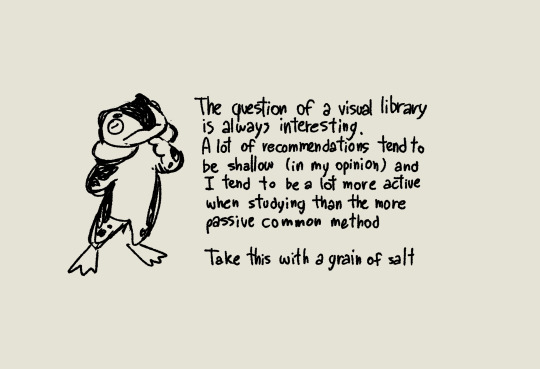

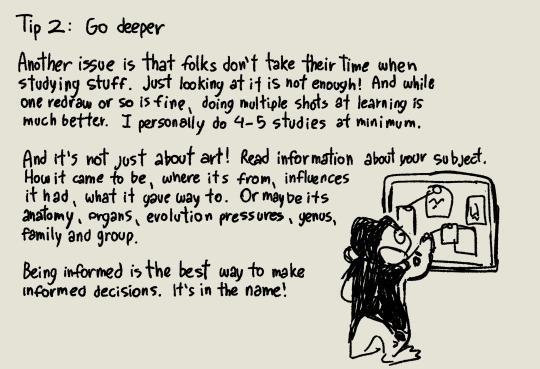

Sorry if this sounds pretentions but I am a nerd about art and learning. Never ask a nerd if youre not prepared for a nerd answer
398 notes
·
View notes
Text
what will it be, boss? the comfort of misery or the pain of change?
95K notes
·
View notes
Text

Another posca painting
200 notes
·
View notes
Text
Folks, backup your Tumblrs, for real this time
#oh nice. why is it that I look at running a python script and automatically feel like it’s way easier than going through a video tutorial#I’m this close to becoming that guy who insists on using the terminal for everything#backup tumblr
47K notes
·
View notes
Text
"le plaisir délicieux... d'une occupation inutile"
is the opening quote of dragons dogma II, and its greatest theme is the question of what you will do to a role thrust upon you.. In a sense; if you can even walk away from Dharma, what are the lengths you would go to?
Basically, the dragon represents = struggle, and the arisen is it's chosen hero to wrestle with. The dragon steals the arisen's heart but the arisen doesn't die. Instead it makes them immortal, with the sole mission of standing up to the dragon to restore their heart. This struggle is sort of like the engine that keeps their world going, yin and yang in the most philosophical way. If there is evil, good will rise to stand against it. Pawns are your eternal servants, they're beings pulled from a metaphysical realm, and they only answer to the arisen. But they are basically beings who do not have their own sense of self, no will, no anything. But as the game continues, and they travel with you, they gain a soul through your actions, and they tell the arisen: you do not stand alone. I had my friend's pawn travelling with me when we killed the dragon together. You can have a number of endings in dragons dogma I.
1. You can walk away from the dragon. He kills your beloved for your cowardice, and you are driven insane despite being granted immeasurable power. That the responsibility you walked away from, will still come for you, it will still reckon with you.
2. You can slay the dragon, save the princess, and be unsatisfied in your complacency, in only doing what you're told without doing anything more.
3. it is canon that when you do not have the strength to defeat the true final boss, you become the dragon to look for your own replacement. And
4. You defeat the dragon, and you continue to seek the deeper meaning of the world, and confront the root of everything, who the hell sent the dragon? You find out its this being called the Seneschal, the steward of the world, who has grown weary, and wanted someone to herald the world in their place, someone worthy, brave, principled. In game, the seneschal has no official design. They were a previous arisen who defeated their own dragon, and then face who sent the dragon; The Seneschal- Who manifests in dragons dogma as other, previous players who have already beaten the game: You fight the spirit of another, real player who has already overcome the game. In the game, when you defeat the seneschal and take their place. You get to become a small spirit, and wander around the world, looking at all the friends you made, your beloved, and you can't say goodbye to them, they can't see you, they're just wondering where you are before you take your place as the new steward of the world- or you can literally end your life with a magic sword called the "godsbane" before you can ever become the seneschal, in complete defiance of what the game was building up to, the "dragon's dogma", in a sense.
Cycles are something inherently neutral, a law of the universe where it does not seek a final ending, no rapture. Dragons Dogma 2 is built on the same narrative. But when you open the game.. it just says "dragons dogma." And people were wondering, huh. Where's the "2"?
Dragons Dogma 1, has this, totally overwhelming sense of grief. but it also has this, very deep attention to detail. For example, when you fall into the water, your lantern dies. a character with shorter legs; walk slower, can't climb monsters fast, can't run fast. A fat character can carry lots of stuff, and can't be knocked down easily. A skinny character can squeeze in small spaces, can get stunned easily. You can throw oil bottles at something, and then throw a ball of fire at it and it will explode. The thing is, despite being so detail oriented, all the freedom to go and do wherever you go, wherever you please, you are still followed, still restrained by the shadow of a dragon. Every kingdom you go to is bruised by the dragon, evil things crawl out of the depths of the world as a symptom,the coming of a dragon essentially means the end of the world, Unless the arisen comes to stop it. So every character you talk to, every problem you come to solve, from a squabble to a skirmish tells you, please, kill the dragon.
Dragons Dogma 2's secret and "true" ending, is that you have to kill yourself while climbing into a hollow in the dragon's chest, literally climbing into the heart of the struggle.
The. Amount of pain, and loss it took to even just get to the dragon is, overwhelming. When I stabbed the dragon, a ghost from earlier, one who haunted your every step as arisen, the one who sees all,..not a god, more like an enforcer of the laws of the world will appear- they come to you, angry. They thrust you into the sea, trying to bury you. What are you doing?? Because, you strayed from the written rules.. you strayed from the "dragon's dogma".
Illusions of your old friends will appear, and they ask you to come back, finish the story, be the arisen, the dragonslayer. And you refuse. And you are thrust into this, viscera, this world of utter ruin, absolute decay, a merciless world that is completely furious at you for abandoning it. And then. The title drops. Dragon's Dogma 2. Dragons. fucking. Dogma.2. 150 hours in. There's so many aspects and philosophies of the game that become so inherent when you enter this last phase, but.. the title drops there, because you essentially forced the story to tell you another one, carve out a new ending for you and your pawn in the wood of its old foundation.
the game is angry at you, it consumes itself in front of you; you can even sense it gnawing at itself. The more you sleep in the game to heal, the more the map shrinks. But you and your pawn face the heart of the game, one more time, fight the dragon at its core.. and die with your companion fighting. That's how the game truly ends, the world fading into something unknown, something else, different,.. new
76 notes
·
View notes









